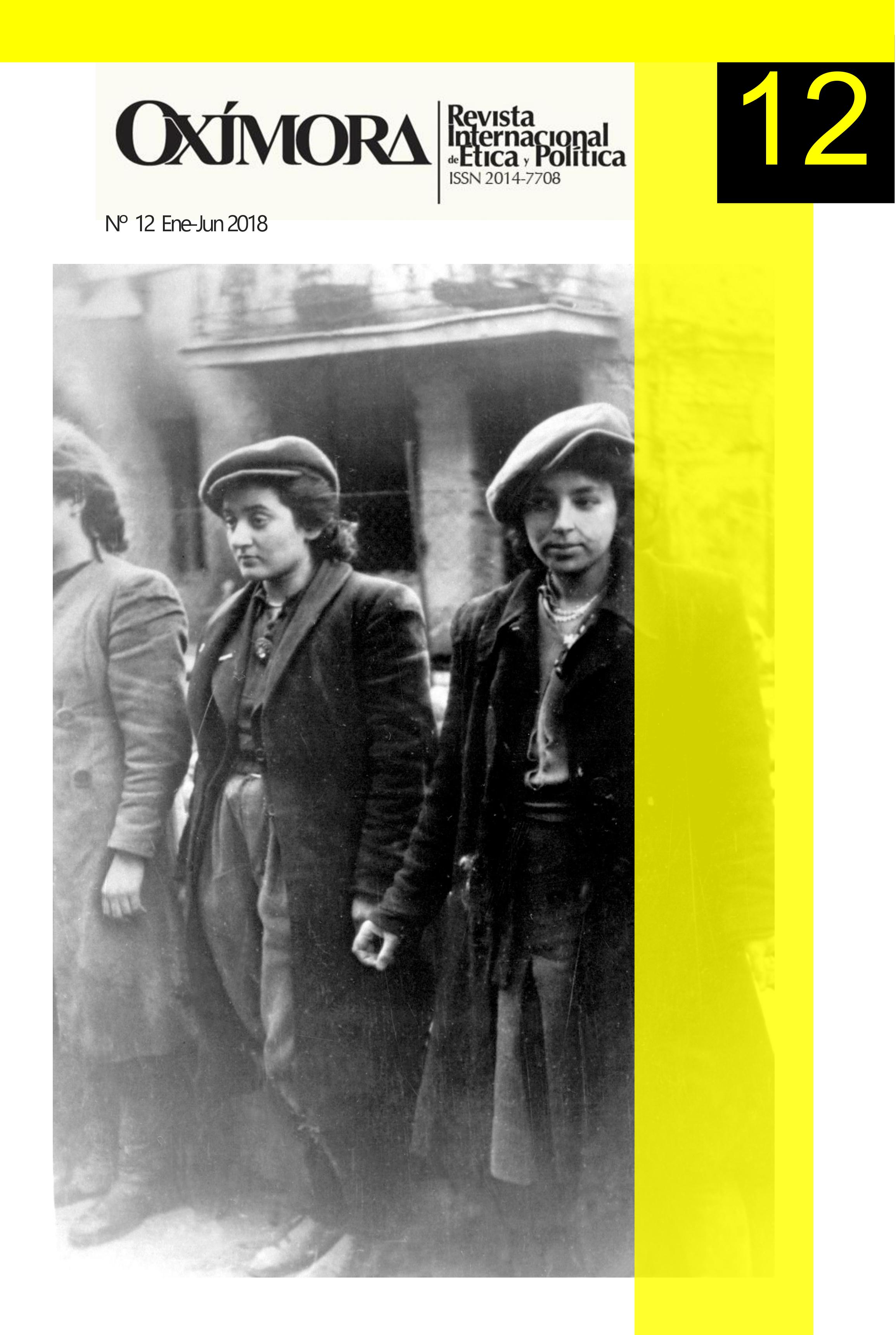Propiedad común y justicia (pre) distributiva
DOI:
https://doi.org/10.1344/oxi.2018.i12.20363Palabras clave:
comunes, derechos de propiedad, pre-distribución, relación fiduciariaResumen
Este artículo discute el impacto que los llamados bienes comunes pueden tener en los regímenes de distribución social. Cuestionando algunas de las nociones más aceptadas de los derechos de propiedad, se sugieren la filosofía del derecho natural y del bundle of rights para conceptualizarlos como una constelación de derechos colectivos que implican a varios agentes que conforman una suerte de relación fiduciaria. La propiedad común entendida así aparece como un modo de fomentar un régimen pre-distributivo en el que los derechos de propiedad de la riqueza y los activos productivos estén diseñados y aplicados sobre las circunstancias estructurales de la misma distribución, y no simplemente como respuesta a los resultados de un sistema de distribución injusto y desigual.
Citas
Appleby, Joyce and Ball, Terrence. (eds.). (1999). Jefferson: Political Writings. Cambridge: Cambridge University Press.
Blackstone, William. (1897[1765]). Commentaries on the Laws of England. Philadelphia: St. Paul, West Publishing Co.
Boyle, James. (2003). “The Second Enclosure Movement and the Construction of the Public Domain”. Law and Contemporary Problems, 66, pp. 33–74.
Casassas, David. (2013). “Adam Smith’s Republican Moment: Lessons for Today’s Emancipatory Thought”, Economic Thought, 2 (2), pp. 1–19.
Chambers, Simone. (2012). “Justice or Legitimacy, Barricades or Public Reason? The Politics of Property-Owning Democracy”, in: O’NEILL, Martin and WILLIAMSON, Ted. (eds.). (2012). Property-Owning Democracy. Rawls and Beyond. Oxford: Wiley-Blackwell.
Coriat, Benjamin. (2013). “Le retour des communs. Sources et origines d’un programme de recherché”. Revue de la Régulation, 14, p. 1–21. Retrieved on June 4 2015, in: http://regulation.revues.org/10463.
de Aquinas, Thomas. (1999[1250?]). Summa Theologiae. Madrid: Biblioteca de Autores Cristianos.
Domènech, Antoni. (2004). El eclipse de la fraternidad. Una revisión republicana de la tradición socialista. Barcelona: Crítica.
Eizenberg, Efrat. (2012). “Actually Existing Commons: Three Moments of Space of Community Gardens in New York City”. Antipode, 44 (3), p. 764–782.
Verbist, Gerlinde; Förster, F. Michael; and Vaalavuo, Maria. (2012). “The Impact of Publicly Provided Services on the Distribution of Resources: Review of New Results and Methods”. OECD Social, Employment and Migration Working Papers, No. 130, OECD Publishing. OECD Publishing.
Hardin, Garrett. (1968). “The Tragedy of Commons”. Science, 62, p. 1243–1248.
Hayek, Friedrich. (1982[1973]). Law, Legislation and Liberty. A New Statement of the Liberal Principles of Justice and Political Economy. London: Routledge.
Hess, Charlotte. (2008). “Mapping the New Commons”. 12th Biennial Conference of the International Association for the Study of the Commons. July 2008. Cheltenham, UK.
Hirschman, O, Albert. (1970). Exit, Voice, and Loyalty: Responses to Decline in Firms, Organizations, and States. Cambridge, Mass.: Harvard University Press. ILO. (1944). “Declaration Concerning the Aims and Purposes of the International Labour Organization (Declaration of Philadelphia)”. Philadelphia: ILO. ILO. (2014). “World of work report 2014: Developing with Jobs”. Geneva: ILO.
Johnson, Denise. (2007). “Reflexion on the Bundle of Rights”. Vermont Law Review, 32, p. 247–272.
Krouse, Richard, and McPherson, Michael. (1988). “Capitalism, Property-Owning Democracy, and the Welfare State” in: GUTMAN, Amy. (ed). (1988). Democracy and the Welfare State. Princeton: Princeton University Press.
Laín, Bru. (2015). “Bienes comunes, nuevos cercamientos y economía política popular”. Política & Sociedad, 52 (1), p. 99–124.
Linebaugh, Peter. (2010). “Enclosures from the Bottom up”. Radical History Review, 108, p. 11–27.
Locke, John. (2003[1690]). Two Treatises of Government and A Latter Concerning Toleration. SHAPIRO, Ian. (ed.). New Haven & London: Yale University Press.
MacGilvray, Erik. (2011). The Invention of Market Freedom. Cambridge: Cambridge University Press.
Meade, James. (1964). Efficiency, Equality and the Ownership of Property. London: George Allen & Unwin, Ltd.
Meade, James. (1975). The Intelligent Radical’s Guide to Economic Policy. London: George Allen & Unwin, Ltd.
Merrill, Thomas, and Smith, Henry. (2001). “What Happened to Property in Law and Economics?”. The Yale Law Journal, 111 (2), p, 357–398.
Ostrom, Elinor. (1990). Governing the Commons: The Evolution of Institutions for Collective Action. Cambridge: Cambridge University Press.
Ostrom, Elinor. (2000). “Private and Common Property Rights” in: Encyclopedia of Law and Economics, II, Civil Law and Economics. Bouckaert, Boudewijn and De Geest, Gerrit. (eds.). (2000). Cheltenham, England: Edward Elgar.
Tierney, Brian. (2004). “The Idea of Natural Rights, Origins and Persistence”. Northwestern Journal of International Human Rights, 2 (1). Retrieved on July 8 2015, in: http://scholarlycommons.law.northwestern.edu/cgi/viewcontent.cgi?article=1005&context=njihr.
Tuck, Richard. (1979). Natural Rights Theories. Their Origin and Development. Cambridge: Cambridge University Press.
Pettit, Philip. (2006). “Freedom in the Market”. Politics, Philosophy and Economics, 5 (2), p. 131–149.
Pettit, Philip. (2014). Just Freedom: A Moral Compass for a Complex World. New York: W. W. Norton & Company, Inc.
Rawls, John. (1971). A Theory of Justice. Cambridge, Mass.: Harvard University Press.
Rawls, John. (2001). A Theory of Justice: A Restatement. KELLY, Erin. (ed.). Cambridge, Mass.: Harvard University Press.
Robespierre, Maximilien. (1886). OEuvres de Robespierre. VERMOREL, Auguste. (ed.) Paris: F. Cournol, Libraire-Éditeur.
Schlager, Edella and Ostrom, Elinor. (1992). “Property-Rights Regimes and Natural Resources: A Conceptual Analysis”. Land Economics, 68 (3), p. 249–262.
Simon, William. (1991). “Social-Republican Property”. University of California Law Review, 38, p. 1335–1415.
Smyth, Albert Henry. (ed.). (1905-7). The Writings of Benjamin Franklin. 10 Vols. New York: Macmillan.
Weidmann, Jens. (2014). Interview in El Confidencial, November 24 2014. Retrieved on July 20 2015, in: http://www.elconfidencial.com/economia/2014-11-24/el-presidente-del-bundesbank-pide-el-contrato-unico-y-menor-proteccion-al-desempleo_504765/.
Winters, Jeffrey A. and Page, Benjamin. (2009). “Oligarchy in the United States?” Perspectives on Politics, 7 (4), p, 731–751.
Widerquist, Karl. (2013). Independence, Propertylessness, and Basic Income: A Theory of Freedom as the Power to Say No. New York: Palgrave, Macmillan.
Wright, Erik Olin. (2006). “Basic Income as a Socialist Project”. Basic Income Studies, 1 (1), p. 1–11.
Descargas
Publicado
Cómo citar
Número
Sección
Licencia
a) El/la autor/a conserva los derechos de autoría, otorgando a la revista el derecho de primera publicación de la obra.
b) Los textos se difundirán con la licencia de reconocimiento de Creative Commons (CC BY) que permite compartir la obra con terceros, siempre que estos reconozcan su autoría, su publicación inicial en esta revista y las condiciones de la licencia.



